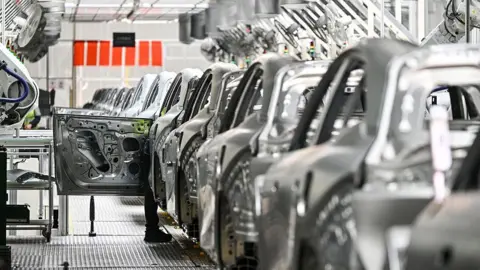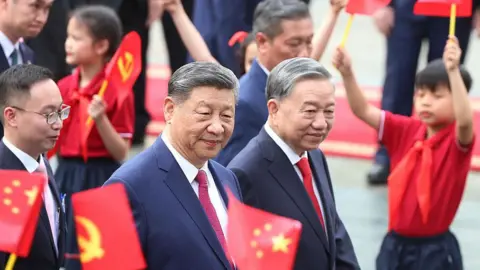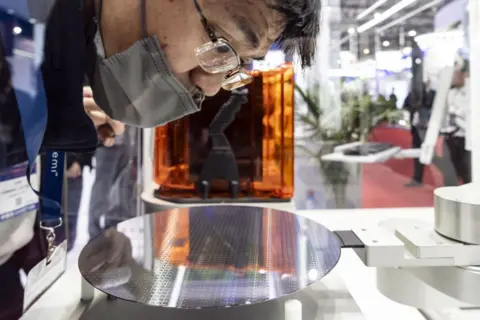A full-blown trade war is now underway between the world’s two largest economies.
Chinese exports to the U.S. are now facing tariffs as high as 245%, while Beijing has retaliated with a 125% tariff on American imports. This escalating conflict is leaving consumers, businesses, and markets on edge, with growing concerns about the potential for a global recession.
Despite the tension, Chinese President Xi Jinping’s administration has expressed willingness to engage in talks, yet has made it clear that it is prepared to “fight to the end” if necessary.
Here’s a closer look at the strategies Beijing may employ to counter the tariffs imposed by U.S. President Donald Trump.
China can take the pain (to a point)
 Getty Images
Getty ImagesThe imposition of tariffs by President Donald Trump has provided the Chinese Communist Party with even more motivation to tap into the country’s consumer potential. According to Mary Lovely, a trade expert at the Peterson Institute in Washington, the Chinese leadership may be willing to endure economic pain in order to avoid giving in to what they perceive as U.S. aggression.
As an authoritarian regime, China is less concerned with short-term public opinion, with no elections looming to judge its leadership. That said, there are concerns over public unrest, particularly given the ongoing property crisis and rising job losses.
For many young people in China, the economic uncertainty tied to the tariffs is especially painful, as they’ve grown up in an era of continuous growth and optimism.
The Chinese government has also been leaning heavily on nationalist rhetoric to justify its retaliatory actions. State media has called on the population to “weather storms together” as a united front. While President Xi Jinping may have concerns, Beijing has so far maintained a defiant and confident stance, with one official reassuring the public: “The sky will not fall.”
China has been investing in the future
 Getty Images
Getty ImagesIn a bid to accelerate its tech growth, Beijing recently announced plans to invest over $1 trillion over the next decade to boost innovation in AI, signaling its commitment to becoming a global leader in this crucial sector.
While many U.S. companies have attempted to shift their supply chains away from China, they have struggled to replicate the scale of infrastructure and highly skilled labor that China offers. The vast network of manufacturers at every level of the supply chain has given China a decades-long edge that is not easily replicated elsewhere.
This unparalleled expertise in manufacturing, combined with strong government support, has made China a formidable adversary in the ongoing trade war. In many ways, Beijing has been preparing for this confrontation since President Trump’s previous term, positioning itself as a resilient competitor in global trade.
Designed in US, made in China: Why Apple is stuck
Trump’s tariffs leave China’s neighbours with an impossible choice
Lessons from Trump 1.0
 Getty Images
Getty ImagesA key example of this shift is seen in China’s changing import patterns. American farmers once provided 40% of China’s soybean imports, but that figure has dropped to around 20%. In response, Beijing has ramped up domestic soy production and turned to Brazil, now its largest soybean supplier. This move serves a dual purpose: it reduces reliance on the U.S. farm sector while enhancing China’s food security. According to Marina Yue Zhang, an associate professor at the University of Technology Sydney’s Australia-China Relations Institute, this strategy “kills two birds with one stone”—depriving the U.S. of a key market while bolstering China’s self-sufficiency credentials.
As of 2023, China is no longer the U.S.’s biggest export market; Southeast Asia has now taken that title. In fact, China was the largest trading partner for 60 countries last year—nearly double the number of the U.S. The country also set a record trade surplus of $1 trillion by the end of 2024, underscoring its growing economic influence.
However, this doesn’t mean that the U.S., the world’s largest economy, is no longer an important partner for China. But Beijing’s growing trade relationships elsewhere make it clear that pressuring China economically will be a far more complex task for Washington.
In response to reports that the White House may use bilateral trade talks to isolate China, Beijing has warned nations against making deals “at the expense of China’s interests.” For many countries, such a choice may be impossible.
As Malaysia’s trade minister Tengku Zafrul Aziz recently stated in an interview with the BBC, “We can’t choose, and we will never choose [between China and the U.S.].”
China now knows when Trump will blink
 Getty Images
Getty ImagesChina, which holds $700 billion in U.S. government bonds, has often been seen as having leverage in this situation. Only Japan, a key U.S. ally, holds more bonds than China. Some analysts have speculated that Beijing could use its bond holdings as a “weapon,” possibly by selling or withholding further purchases. This has been a recurring topic in Chinese media.
However, experts caution that using U.S. bonds as leverage would not come without significant risks. Such a move would lead to heavy losses on China’s bond investments and could destabilize the Chinese yuan. Dr. Zhang, an expert in international finance, notes that China can only apply pressure with its bond holdings “up to a point,” emphasizing that while the bonds provide China with some bargaining power, they do not constitute a true financial weapon.
A chokehold on rare earths
 Getty Images
Getty ImagesChina dominates the rare earths market, accounting for about 61% of global production and an overwhelming 92% of refining, according to the International Energy Agency (IEA). Although countries like Australia, Japan, and Vietnam have begun mining rare earths, it will take years to develop alternative supply chains capable of matching China’s scale and expertise.
In 2024, China escalated its use of rare earths as a strategic asset by banning the export of another key mineral, antimony, which is critical for various manufacturing processes. This move led to a dramatic spike in prices, more than doubling amid panic buying as countries scrambled to find alternative suppliers.
The fear is that China could use its control over the rare earths market in a similar way, creating severe disruptions across multiple industries—from electric vehicles to defense. As Thomas Kruemmer, director of Ginger International Trade and Investment, notes, “Everything you can switch on or off likely runs on rare earths,” highlighting the significant impact such disruptions could have, particularly on the U.S. defense industry.



